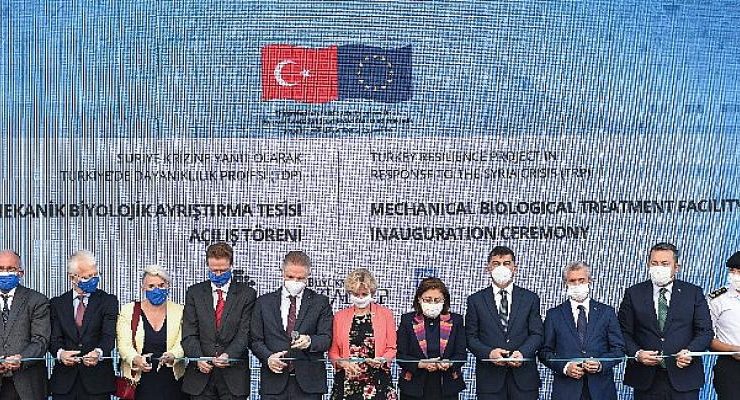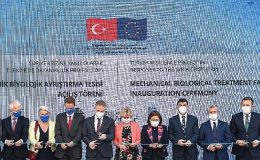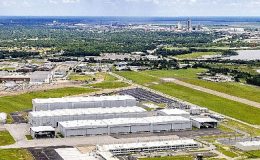

A new EUR 9.2 million facility funded by the EU and constructed by UNDP provides green solutions to help the municipality meet daunting challenges in waste management
A state-of-the-art waste management facility that was opened today in Gaziantep will help the municipality solve one of the biggest challenges arising from the dramatic increase in the city’s population as a result of the Syrian refugee crisis. The EUR 9.2 million facility was funded by the European Union (EU) and built by the United Nations Development Programme (UNDP) in partnership with Ilbank and the Gaziantep Metropolitan Municipality. With the capacity to process 100,000 tons of solid waste per year, the new facility is one of the largest of its type in Europe and a model of circular economy principles: when fully operational, it will generate new revenues for the Gaziantep budget by selling biogas and recycled resources.
Today’s opening ceremony of the Mechanical Biological Treatment Facility (MBTF) was attended by Gaziantep Province Governor Davut Gül, Ambassador Nikolaus Meyer-Landrut at the head of a delegation of Ambassadors from 9 EU member states, Gaziantep Mayor Fatma Şahin, Ilbank representatives and UNDP Resident Representative Louisa Vinton.
“Turkey has demonstrated remarkable hospitality in hosting nearly four million Syrians fleeing civil war in their own country,” said Meyer-Landrut. “We recognize the stress this influx has put on host communities across Turkey. That is why we have invested in municipal waste management in Gaziantep as part of our broader EUR 6 billion assistance programme. The EU will continue to support Turkey in hosting the refugees with additional 3 billion in the upcoming period.”
Gaziantep had 1.7 million residents before the Syria crisis began, but its population swelled to over 2.2 million with an influx of more than 450,000 Syrians under temporary protection. The increase in population has resulted in an increase of waste by 25 percent.
“This new facility will help us meet our responsibility to deliver essential public services,” said Şahin. “But it is much more than that. It will help ensure that we can manage other challenges posed by sudden expansion in the city’s population. For this we are extremely grateful to the EU for its vital financial support and UNDP for leading the project together with Ilbank.”
Since 2018, with EUR 50 million in EU funding, UNDP has been helping Gaziantep and other cities hosting large numbers of Syrians to expand and improve their municipal services, while also promoting skills development and job creation for refugees and host communities alike. The MBTF is the largest of eight waste-management facilities that UNDP has constructed in southeastern Turkey since 2018 with EU funding.
“The new treatment plant is an investment in a greener future for Turkey,” said UNDP’s Vinton. “Not only are we helping Gaziantep expand its delivery of vital public services; we are also showing by example how cities can find sustainable, environmentally-friendly ways to meet the needs of their constituents, in this case quite literally by transforming garbage into a valuable resource that can help fill rather than empty the city budget.”
Equipped with state-of-the-art technology, the MBTF will generate clean energy from biodegradable waste, separate recyclables and extend the life of Gaziantep’s solid waste landfill. Annual output will include 4,100 MWh of energy, 17,000 tons of recyclables and 23,000 tons of reclaimed refuse-derived fuel.
The electricity produced at the facility will fully power its operations while generating a surplus for sale, creating a new revenue stream for the municipality. The recyclable waste reclaimed at the facility will also generate income. And the facility will reduce Gaziantep’s annual greenhouse gas emissions by 9,309 tons of CO2.
The other waste-management facilities constructed by UNDP under the EU-funded programme include a EUR 4-million wastewater treatment plant in Hassa, a town of 40,000 in Hatay Province, where untreated sewage was previously discharged directly into the Tiyek Stream. The initiative has thus removed a major source of pollution and contributed to a successful campaign to restore the ecological health of the Asi River.
Other facilities built by UNDP with EU funding include four solid waste transfer stations in Hatay Province. These serve to reduce greenhouse gas emissions and cut municipal transportation costs by compressing and consolidating garbage into bigger cargos for streamlined delivery to local landfills. Finally, an innovative greenhouse solar dryer facility erected by UNDP in the city of Kilis transforms sludge residue from wastewater treatment plants into high-value byproducts that can be used to enrich topsoil or fuel cement production.
Kaynak: (BHA) – Beyaz Haber Ajansı
 1
Airbus reveals the next generation of CityAirbus
23029 kez okundu
1
Airbus reveals the next generation of CityAirbus
23029 kez okundu
 2
Airbus and partners target more energy efficient flights
23009 kez okundu
2
Airbus and partners target more energy efficient flights
23009 kez okundu
 3
Turning solid waste into resources in Gaziantep
22800 kez okundu
3
Turning solid waste into resources in Gaziantep
22800 kez okundu
 4
Airbus to deliver U.S.-completed commercial aircraft with Sustainable Aviation Fuel
22363 kez okundu
4
Airbus to deliver U.S.-completed commercial aircraft with Sustainable Aviation Fuel
22363 kez okundu
 5
ACJ and contemporary artist, Cyril Kongo, partner to offer a special ACJ TwoTwenty cabin edition
22305 kez okundu
5
ACJ and contemporary artist, Cyril Kongo, partner to offer a special ACJ TwoTwenty cabin edition
22305 kez okundu
Veri politikasındaki amaçlarla sınırlı ve mevzuata uygun şekilde çerez konumlandırmaktayız. Detaylar için veri politikamızı inceleyebilirsiniz.